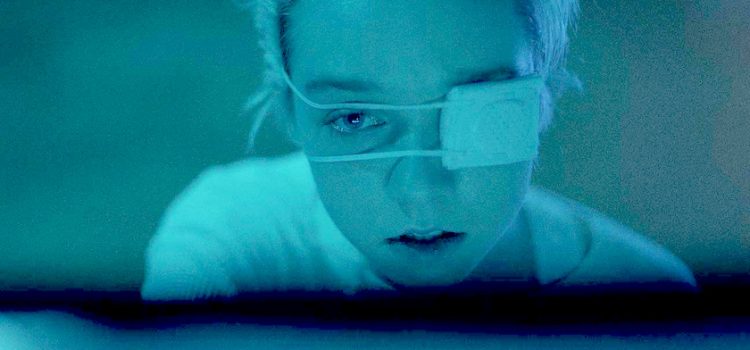By Alex McPherson
Anthony Scott Burns’ new directorial effort, “Come True,” is a flawed yet eerily effective horror film that explores the nature of dreams.
Burns’ film centers around Sarah Dunne (Julia Sarah Stone), a sleep-deprived high school student drifting through her day-to-day life. She refuses to stay at her mother’s house, possibly due to an abusive past, and relies on her friend, Zoe (Tedra Rogers), as her main support system. She has recurring nightmares where she flows through a post-apocalyptic wasteland containing shadowy figures, cavernous interiors, and a never-ending stream of passageways — always ending near a humanoid, cloaked in darkness, with glowing eyes and an imposing physique.
Lacking a secure place to slumber overnight, Sarah enrolls in a sleep study run by a group of scientists with suspicious morals. The team, led by Dr. Meyer (Christopher Heatherington), is able to observe participants’ dreams as they’re experiencing them, thanks to some 80s-inspired sci-fi technology. Soon enough, the study goes off the rails as strange events start occurring. What ensues is a mind-boggling ride where Sarah’s life is thrown into turmoil.
Suffice it to say, “Come True” is out there. Viewers expecting clear-cut resolution will be disappointed. Indeed, Burns’ film sacrifices plot coherence for atmosphere and mood. This style, however, ultimately overshadows some thematic missteps later on.
Eschewing the jump-scare-heavy tendencies of mainstream horror, “Come True” relies primarily on creating a sense of uneasiness and danger looming on the horizon. Burns’ precise cinematography — full of slow zooms and long, drawn-out shots of mysteriously empty streets and glossy, claustrophobic interiors — encourages us to consider more malevolent operations behind the scenes.
The proceedings are also divided into chapters with Jungian-inspired titles, such as “The Persona” and “The Shadow,” inferring a grander picture beyond Sarah’s immediate situation. Combined with the aforementioned nightmarish sequences and a score overly reliant on the synthesizer — it’s practically as if we’re experiencing a dream along with Sarah.
Regarding her character, Stone gives a noteworthy performance that renders Sarah captivating from beginning to end. Although “Come True” withholds information from us regarding her past experiences, Stone empathetically conveys her exhaustion, fear, and disorientation as she’s sent down a turbulent path that keeps both herself, as well as viewers, second-guessing what’s real and what isn’t.
Her character arc, as well as the plot’s larger themes, aren’t spelled out to viewers, which heightens unpredictability and encourages reflection once the end credits roll. This is a highly metaphorical, bizarre coming-of-age tale of subconscious thoughts rendered conscious experience, targeting universal fears that the screenplay assumes many of us share. “Come True” takes some work to decipher, but holds rewards for viewers up for the challenge. At least, I think so. There’s some elements of the story I haven’t wrapped my head around yet.
That’s not to say the film’s ambiguity works entirely in its favor. When a young, creepy scientist named Jeremy (Landon Liboiron) shows up, “Come True” expects viewers to care for him, and his uncomfortable relationship with Sarah, without developing his character in a satisfying fashion. Saddled with occasionally clunky dialogue, he remains far less interesting than Sarah herself.
Additionally, the film’s final moments are unintentionally humorous and feel overly blunt in comparison to the slow-burn pace adopted previously. More than anything else, viewers will likely be left feeling befuddled and maybe even cheated.
Despite unfortunate detours into perversion and muddled storytelling in its latter half, “Come True” provides memorable visuals and a multi-layered plot that earn a recommendation.
“Come True” is an unrated sci-fi horror film from IFC Midnight that was released March 12. Directed by Anthony Scott Burns, it stars Julia Sarah Stone, Christopher Heatherington and Landon Liboiron, it runs 1 hour, 45 minutes. Alex’s grade: B
Alex McPherson is an unabashed pop culture nerd and a member of the St. Louis Film Critics Association.

